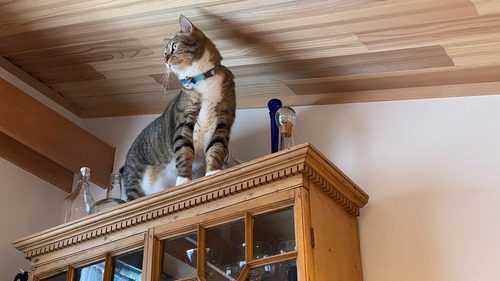Many pet owners ask, is marijuana toxic to cats? The answer is yes. Cats can experience harmful effects when exposed to marijuana, whether through inhalation of smoke, accidental ingestion of dried plant material, or consumption of edibles. Because marijuana affects the nervous system, even small amounts can lead to noticeable changes in behavior and health. This blog explains how marijuana impacts cats, signs of toxicity, and what pet owners should know to protect their pets.

Why Pet Owners Are Asking: Is Marijuana Toxic to Cats?
With the legalization of marijuana in many states, more households are storing or using cannabis products. While these items may seem harmless, cats are highly sensitive to the compounds in marijuana. Tetrahydrocannabinol (THC) is the primary psychoactive component, and it is toxic to cats. Unlike humans, cats lack the tolerance or ability to process these substances safely.
The rise in marijuana use has also led to an increase in veterinary visits related to cannabis ingestion. Curious cats may nibble on leaves, dried flowers, or edibles left unattended. Even secondhand smoke can affect them because their smaller bodies absorb THC more quickly than humans. Asking “Is marijuana toxic to cats?” is more important now than ever for responsible pet care.
How Marijuana Affects a Cat’s Body
To understand the dangers, it helps to look at how marijuana interacts with a cat’s body.
THC and the Feline Nervous System
THC alters communication between brain cells, which is why cats may show sudden changes in coordination, mood, and awareness after exposure. Their neurological system is not built to handle the intensity of this chemical, so even minor contact can be overwhelming.
Metabolism and Toxicity
Cats metabolize substances differently than humans. Their liver cannot break down THC efficiently, leading to prolonged and sometimes severe effects. This delayed processing means symptoms may appear hours after ingestion and last much longer than owners expect.
Common Signs of Marijuana Toxicity in Cats
Pet owners often notice sudden changes in their cat’s behavior or physical condition after accidental exposure. If you are asking “Is marijuana toxic to cats?”, recognizing the signs can help you act quickly.
Behavioral Changes
- Disorientation or confusion
- Extreme lethargy or hyperactivity
- Unusual vocalizations
- Hiding or restlessness
Physical Symptoms
- Loss of balance or uncoordinated movements
- Dilated pupils
- Vomiting
- Low body temperature
- Tremors or seizures in severe cases
Because these symptoms overlap with other medical conditions, it’s important for a veterinarian to make the proper diagnosis.
Why Cats Are at Higher Risk
While dogs also suffer from cannabis toxicity, cats face unique risks.
Grooming Behavior
Cats often groom themselves after walking across surfaces with marijuana residue, such as ashes, smoke particles, or spilled plant material. This leads to ingestion even if they did not directly consume the substance.
Curiosity and Climbing
Cats naturally explore counters, tables, and shelves, making it easy for them to access stored cannabis. Edibles like brownies or gummies can be particularly dangerous, as they combine THC with chocolate or artificial sweeteners, both of which are toxic to pets.
Smaller Body Weight
Because cats are smaller, even trace amounts of THC have a stronger impact compared to larger animals. This means that what seems like a minimal dose to humans can be overwhelming for cats.
The Dangers of Edibles for Cats
One of the most common ways cats are accidentally exposed to marijuana is through edibles.
Added Toxic Ingredients
Many edibles include ingredients already harmful to cats, such as chocolate, caffeine, or xylitol. When combined with THC, the toxic effects multiply, creating a higher risk of serious illness.
Slow Digestion
Cats digest edibles more slowly, which allows THC to remain in their system for longer. Symptoms may take several hours to appear and may last more than a full day. This delayed effect often catches owners off guard.
Secondhand Smoke and Cats
Some pet owners believe that marijuana smoke is harmless, but this is not the case.
Inhalation Risks
Cats exposed to secondhand marijuana smoke may develop respiratory irritation and neurological symptoms. Their smaller lungs and sensitive respiratory systems make them more vulnerable than humans.
Environmental Exposure
Because cats are prone to lounging in enclosed spaces, they may inhale concentrated amounts of smoke in a short time. Even brief exposure can affect their nervous system and behavior.
How Veterinarians Diagnose Marijuana Toxicity
When owners ask, “Is marijuana toxic to cats?”, veterinarians emphasize that diagnosis requires a thorough history and examination.
Medical History
Your veterinarian may ask if marijuana is present in the home. Honest communication helps them reach a faster diagnosis and prevents unnecessary testing.
Clinical Signs
Observation of neurological symptoms, combined with a pet owner’s report of possible exposure, often points to marijuana toxicity.
Diagnostic Testing
Blood tests may be performed to rule out other causes of similar symptoms. While specific THC testing for pets is limited, overall diagnostics help confirm the source of illness.
What You Can Do to Prevent Marijuana Toxicity in Cats
Prevention is the most effective way to protect cats from marijuana toxicity.
- Safe Storage: Keep marijuana and edibles in secure, pet-proof containers stored out of reach. Avoid leaving products on counters, nightstands, or coffee tables.
- Smoke-Free Environment: Never expose cats to secondhand marijuana smoke. Always smoke outdoors and away from your pet to reduce the risk of inhalation.
- Awareness and Education: If you live with roommates, family members, or visitors who use marijuana, make sure everyone knows the dangers for cats and agrees to handle cannabis responsibly.
Why Prompt Veterinary Care Matters
If a cat is exposed to marijuana, veterinary care is essential. Delayed treatment can worsen symptoms and prolong recovery.
Professional Support
Veterinarians provide monitoring, supportive care, and the interventions necessary to help cats recover safely.
Peace of Mind
Even if the exposure was minor, seeking professional guidance gives pet owners reassurance and helps prevent complications. For pet owners in Millis, MA, the team at Millis Animal Hospital is ready to help. If you suspect your cat may have been exposed to marijuana, call 508-376-5317 or make an appointment online for immediate support.
Protecting Cats from Hidden Household Dangers
So, is marijuana toxic to cats? Absolutely. Exposure to THC in any form can cause serious health problems. From edibles to secondhand smoke, marijuana poses risks that pet owners should not underestimate. By understanding how marijuana affects cats, recognizing the signs of toxicity, and practicing prevention, you can help your cat stay safe and healthy. If you ever have concerns, the compassionate veterinary team at Millis Animal Hospital is ready to provide the care your cat needs. Call 508-376-5317 or schedule an appointment online today.
Recent Posts
About Us
Millis Animal Hospital is a privately owned AAHA-accredited, Cat-Friendly Certified practice staffed with Fear Free Certified professionals. We know a thing or two about treating pets and their families the way they deserve, with excellent preventive care and surgical services tailored to your individual needs.
